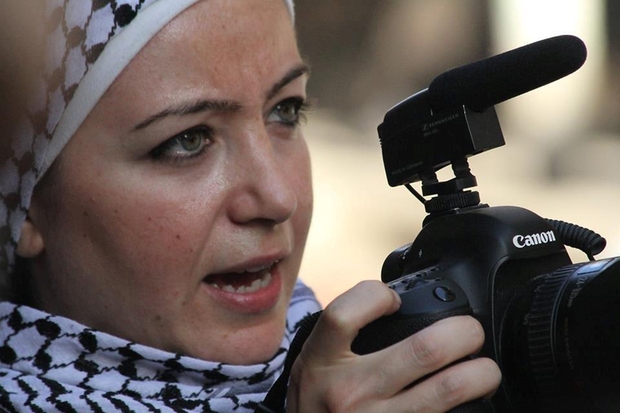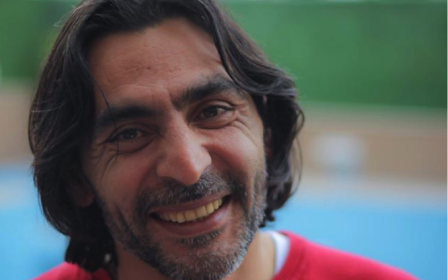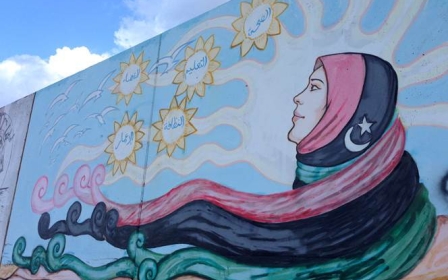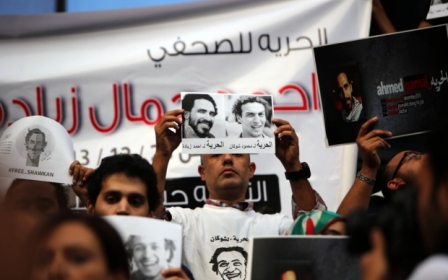Despite threats, Syrian journalists strive for truth amid war

A child plays with his brothers in Aleppo’s rubble. He picks up a cluster bomb and shakes it while laughing. It explodes, and he loses his left hand as well as two fingers of his right hand. Traumatised, he no longer recites the alphabet with the other kids at the mosque and cries most of the time.
This tragic and sadly banal destiny has become an everyday reality in today’s Syria; a Syria engulfed by war. The European public had a glimpse of this little boy's story at the Copenhagen Festival where a documentary by Syrian journalist Hassan Kattan entitled "Clustered" was screened for the first time.
However, the story doesn't start and stop there. To understand how the story of a Syrian child, mutilated by a weapon prohibited in 108 countries, could be unveiled in full in the Danish capital, one needs to go to Gaziantep, in southern Turkey. This city of 1.5 million residents, located 60km away from the Syrian border, has become a hub of independent media production covering the Syrian conflict.
Since August 2014, the Syrian Media Incubator, founded by a French co-op, has delivered Syrian citizen-reporters equipment and professional training to better exercise their profession. More than 200 Syrian journalists have already gone there, among them Hassan Kattan, a member of the Aleppo Media Centre.
"Two months ago, we offered video training to 11 journalists. Then they were given an iPhone and they returned to Syria to make films. Upon their return, we have edited and produced their work in these studios and soon after, Hassan Kattan’s film was screened in Denmark," said Ahmed Deeb, a Palestinian photojournalist and audiovisual trainer at the Incubator.
At the same time, journalists from the Abraj network - a collective of six Syrian radio stations - attended courses relating to the production of newsletters in the adjacent room. Mohammad al-Hani, a Tunisian who has trained for a year and a half with the Incubator, noticed the gradual change in citizen-reporters’ mentality.
"They have all been trained in-situ. Taken by surprise by the war and determined to describe its reality, they want to become more professional. For example, we have just spoken about the importance of cross-checking sources with Abraj’s journalists," Hani told Middle East Eye.
"More and more citizen-journalists want professionalisation. They no longer want to express a personal opinion, or exercise first-level activist journalism. Of course, most of them are activists because they are motivated by the revolution and defend the values of freedom, diversity, democracy and pluralism. But they want to do it with professional tools," the Tunisian journalist said.
In a particular training session, Marwa Bakri, a young journalist, emphasised issues surrounding importantance of independent information.
"At Hara FM, we have correspondents in Aleppo, in the rebel camp and in territory controlled by the regime, in Idlib, in Damascus and even in Raqqa," Bakri told MEE.
"So we can talk about life under the control of the regime, giving voice to those who complain about certain shortcomings or abuses, without being restricted by censorship. But on the other side, we will also listen to the victims of abuses committed by the opposition forces and we do not hesitate to talk about it.
"We give a voice to citizens who endure the consequences of the war on a daily basis, regardless of their allegiances," explained the 23-year-old. She was trained in Turkey after fleeing her native Qalamoun region that has come under government bombardment.
Syrian women's magazines and free radios
Although she expressed satisfaction with the training she received in the Incubator, Bakri remains realistic. "We learned a lot about theory. The problem is that it is hard to implement it on the ground in Syria. First, we suffer from a severe lack of funding. But above all, how can you work with the continuous bombing? Being an eyewitness is often too dangerous, but it is also very difficult to verify stories and check sources," she said with a sigh.
Reem al-Halabi has paid a high price for reporting from the ground in Syria. In May 2012, while covering a peaceful demonstration in Aleppo for a foreign television channel, she was shot and wounded. She was one among many victims of the Syrian regime’s violent repression of protests. "Weapons are the oppressor’s voice," she said sitting in the office of the Nasaem radio and Yasmine magazine, which she founded.
What is remarkable about Yasmine? This is a women's magazine, something unprecedented in Syria. Originally, Reem’s aspiration was to give voice to women silenced by the thunderous noise of weapons: "Women have played an obvious role in the peace movement, especially in Aleppo, but when the weapons came out, they [women] went back home. It was impossible to work. I wanted to provide them with the support to work and shed light on their problems.
"First we hosted a programme dedicated to women in the small radio station that we had launched in an area that was under the rebels’ control in Aleppo in late 2012, in response to the regime’s shutting down of communications. Then shortly after we launched the first issue of Yasmine," she recalled.
Three years later, the monthly magazine, printed in Gaziantep, was distributed in Aleppo, Idlib, in some IDP camps in Syria and refugee camps in Turkey. Radio Nasaem broadcasts its programmes 16 hours a day in the same regions.
While independent media outlets have proliferated at the same time, threats to Syrian journalists have multiplied.
On 30 October, Ibrahim Abd al-Qader, co-founder of the network Raqqa is Being Slaughtered Silently (RBSS), and his friend Fares Hamadi, a reporter for the Syrian media collective "An Eye on My Homeland," were found dead in an apartment in Sanliurfa, 150 km from Gaziantep. The crime was claimed by the Islamic State (IS) group, a turning point for Syrian citizen-journalists.
"This is a message to all journalists working to deconstruct the propaganda promoted by IS: 'We can reach and destroy you, wherever you are,'" Deeb said.
"In Gaziantep, some journalists have received death threats from IS, accompanied by photographs of their homes, but members of RBSS told MEE they would not stop, as they want to show the world the reality of IS. Journalists who criticise the regime are also threatened. All Syrian journalists suffer because armed groups of all persuasions do not respect their job of informing people," he added.
'Syria will become a black hole'
In late November, RBSS received the International Press Freedom Award from the Committee to Protect Journalists, which had counted more than 85 journalists killed in Syria since the conflict began, including 57 percent by the Bashar al-Assad’s government forces.
In his acceptance speech, Abdel Aziz al-Hamza, a spokesman for the network established in April 2014 by 17 activists from Raqqa, bluntly summed up the position of Syrian reporters: "We are stuck between two aggressive and brutal forces. The first is the criminal regime, obsessed with power, which claims to be fighting against terrorism by killing Syrian children. The second force spreads evil and injustice and covers our nation in black. Both sides consider us to be criminals because we expose their actions to the world."
Since the killing of the two Syrian journalists in Şanlıurfa, Reem al-Halabi said he wants to remain calm and collected: "We have redoubled precautions, but we do not want to push our journalists into paranoia. We would like to have some kind of international protection for journalists working in Syria. Journalism is a dangerous profession in itself, but as Syrians, we are doubly exposed," she said, before warning:
"Without the presence of Syrian journalists, Syria will become a black hole where any camp, whether the Syrian regime or the Islamic State, can do whatever it wants, without the control and pressure exercised today by the international community."
Translated from French by Ali Saad
Middle East Eye propose une couverture et une analyse indépendantes et incomparables du Moyen-Orient, de l’Afrique du Nord et d’autres régions du monde. Pour en savoir plus sur la reprise de ce contenu et les frais qui s’appliquent, veuillez remplir ce formulaire [en anglais]. Pour en savoir plus sur MEE, cliquez ici [en anglais].




